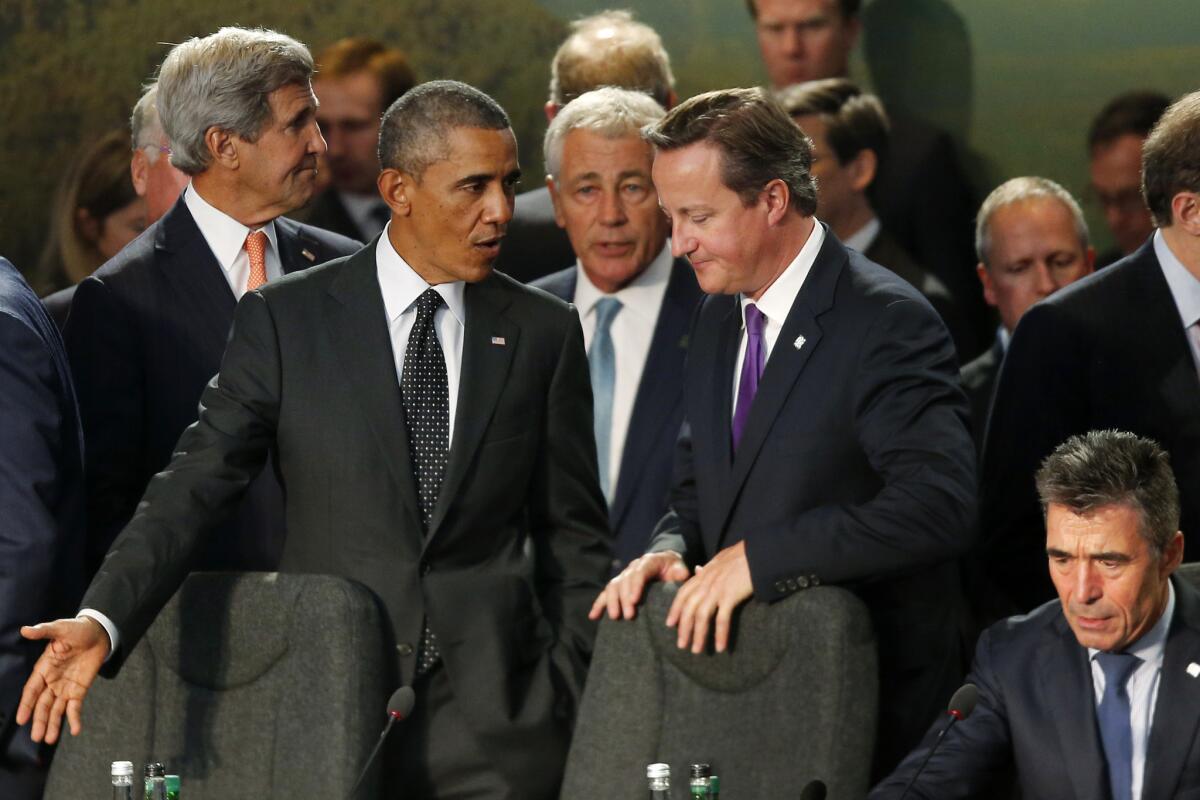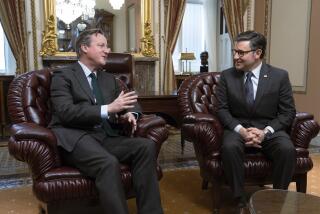Iraq crisis prompts Obama, Cameron to revisit U.S.-Britain ties

- Share via
Reporting from Cardiff, Wales — President Obama and British Prime Minister David Cameron began Thursday by making a joint call to action in a newspaper piece against “barbaric” terrorists in Iraq. They also visited an elementary school in the morning before attending the NATO summit, where they were seatmates, to discuss the crisis in Ukraine.
A year after an embarrassing stumble in U.S.-Britain relations over Syria, the two leaders seemed determined to show that their relationship is, indeed, still special.
Obama came to Wales this week searching for allies to confront Islamic State militants, and Cameron appeared the most eager to volunteer. The prime minister declared that he had not ruled out airstrikes on the group’s forces in Iraq and Syria, echoing language frequently used by the White House to preserve the option of increased military action. He vowed, as Obama has in recent days, not to shy away from confrontation.
“Countries like Britain and America will not be cowed by barbaric killers,” Cameron and Obama wrote in their joint opinion piece in the Times of London. “We will be more forthright in the defense of our values, not least because a world of greater freedom is a fundamental part of how we keep our people safe.”
The Iraq crisis is shaping up as a do-over for a prime minister and a president whose relationship has been overshadowed — some say haunted — by the exceptional and problematic closeness of two of their predecessors, Prime Minister Tony Blair and President George W. Bush.
Like many Americans, Britons remain wary of new military engagements after more than a decade of war in Iraq and Afghanistan. For the British, there is the added perception that they were led into war by a leader too eager to please his American counterpart.
British newspapers’ characterization of Blair as Bush’s “poodle” remains fresh.
Obama and Cameron have tried to demonstrate a personal closeness. They are about the same age and even have had some of the same advisors, despite the fact that Cameron, a Conservative, and Obama, a Democrat, disagree on some political matters.
The men regularly joke awkwardly about sports in public. But no one argues that they are in sync in the Blair-Bush mold.
Cameron, said one analyst, is trying to run from the bond the previous pair had during the early Iraq years.
“This is not the Blair-Bush relationship,” said Heather Conley, director of the Europe program at the Center for Strategic and International Studies. “There is this tug to re-create the special relationship … but it has been diminishing over time.”
Peril in the Middle East, however, may be reinvigorating.
The crisis in Iraq touched both countries directly. A British citizen is among those being held hostage by Islamic State militants, and two Americans were beheaded, apparently by a British national.
Europe is more susceptible to an attack by the militants because of the threat of extremists who leave its nations to join the fight and have passports to travel back and forth, intelligence experts have said.
The concern of British officials is rising along with the threat, a top Obama administration official told reporters at the summit.
“They’re seized with the potential of returning foreign fighters,” said Douglas Lute, a retired Army lieutenant general who serves as Obama’s ambassador to the North Atlantic Treaty Organization. “They know they have a serious security threat.”
By contrast, one of Obama’s top counter-terrorism officials said this week that the militants “are not Al Qaeda pre-9/11,” and that American officials had no credible information that the militants plan to attack the United States.
The alignment is largely rhetorical for now. Britain has not participated in airstrikes against militants in Iraq and instead has focused its contributions on humanitarian support.
Still, aides to the president said Thursday that the term “special relationship” remains applicable to the U.S. and Britain.
“There’s no country that we’re more in sync with in terms of our values and our security cooperation,” said Ben Rhodes, deputy national security advisor to Obama. “That is the spirit that illuminates the conversation between the president and the prime minister.”
Obama is under intense pressure to outline a strategy for crushing the militant group’s core operations across the border in Syria. He has suggested he’s moving slowly toward an escalation.
Cameron, conversely, hedged on plans for military engagement, saying in interviews before the NATO summit that he doesn’t “rule anything out,” but also emphasizing the importance of supporting political reform in Baghdad and bolstering Iraqi and Kurdish forces.
The White House said the president and the prime minister had discussed a “range of options” Thursday. Their conversation took place at a summit with an official agenda of winding down the Afghanistan war and confronting Russia over the conflict in Ukraine.
Both the White House and Cameron emphasized that they are aiming for a broad international coalition to take on Islamic extremists, one that would include European allies as well as Iraq’s neighbors. To that end, they sat down with NATO leaders, and Obama met privately with King Abdullah II of Jordan to solicit his backing.
The search for allies has echoes of Obama’s ultimately aborted plans for intervention in the Syrian civil war a year ago. After expressing his support for Obama’s mission, Cameron failed to win a vote in the House of Commons, delivering a harsh blow to the president’s plan. Shocked White House officials privately marveled at how Cameron could make such a political miscalculation.
That low point in the relationship reflected public wariness over military intervention.
Some British observers suggest that feeling may be subsiding. Fear that Islamic State presents a rapidly growing threat is shifting British public opinion, said Joe Twyman, head of Political and Social Research at the polling firm YouGov.
“What we’re seeing is the culmination of successive atrocities,” Twyman said. The militants “have been adept at their handling of the media, and what we’re seeing is a reaction to that,” he said.
Analysts suggested Cameron’s comments that nothing has been ruled out were aimed at gauging that opinion shift — and, perhaps, showing that he has learned from last year’s mistake. He may yet end up as Obama’s closest ally, thrown together by circumstances in Iraq neither probably envisioned when they took office.
Hennessey reported from Cardiff and Parsons from Washington. Special correspondent Christopher Werth in London contributed to this report.For more news from President Obama’s trip, follow @Khennessey on Twitter
More to Read
Sign up for Essential California
The most important California stories and recommendations in your inbox every morning.
You may occasionally receive promotional content from the Los Angeles Times.












